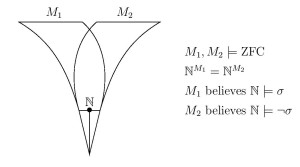 This will be a talk for the Dartmouth Mathematics Colloquium on January 23rd, 2014.
This will be a talk for the Dartmouth Mathematics Colloquium on January 23rd, 2014.

Abstract. Using infinite chess as a central example—chess played on an infinite edgeless board—I shall give a general introduction to the theory of infinite games. Infinite chess is an example of what is called an open game, a potentially infinite game which when won is won at a finite stage of play, and every open game admits the theory of transfinite ordinal game values. These values provide a measure of the distance remaining to an actual victory, and when they are known, the game values provide a canonical winning strategy for the winning player. I shall exhibit
several interesting positions in infinite chess with high transfinite game values. The precise value of the omega one of chess, however, the supremum of all such ordinal game values, is an open mathematical question; in the case of infinite three-dimensional chess, meanwhile, Evans and I have proved that every countable ordinal arises as a game value. Infinite chess also illustrates an interesting engagement with computability issues. For example, there are computable infinite positions in infinite chess that are winning for white, provided that the players play according to a computable procedure of their own choosing, but which is no longer winning for white when non-computable play is allowed. Also, the mate-in-n problem for finite positions in infinite chess is computably decidable (joint work with Schlicht, Brumleve and myself), despite the high quantifier complexity of any straightforward representation of it. The talk will be generally accessible for mathematicians, particularly those with at least rudimentary knowledge of ordinals and of chess.
Poster | Slides (8mb) | Transfinite game values in infinite chess | The mate-in-n problem of infinite chess is decidable
 This will be a talk for the Dartmouth Logic Seminar on January 23rd, 2014.
This will be a talk for the Dartmouth Logic Seminar on January 23rd, 2014. On the basis of these mathematical results, Ruizhi Yang (Fudan University, Shanghai) and I have argued that the definiteness of truth in a structure, such as with arithmetic truth in the standard model of arithmetic, cannot arise solely from the definiteness of the structure itself in which that truth resides; rather, it must be seen as a separate, higher-order ontological commitment.
On the basis of these mathematical results, Ruizhi Yang (Fudan University, Shanghai) and I have argued that the definiteness of truth in a structure, such as with arithmetic truth in the standard model of arithmetic, cannot arise solely from the definiteness of the structure itself in which that truth resides; rather, it must be seen as a separate, higher-order ontological commitment.


